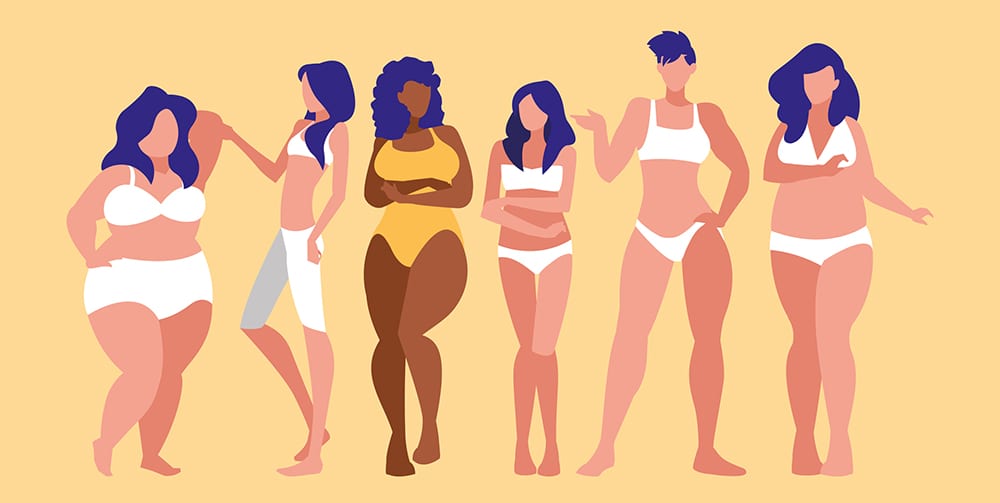Tired of being told to just love your body? The body positivity movement is making way for body neutrality which takes a more nuanced approach to the ways we view our bodies.
If you’ve ever struggled with the concept of body positivity – you’re not alone. “The body-positive movement can be very confusing with often contradictory messages about beauty and health,” admits psychologist and director of Body Matters Australasia, Sarah McMahon. Simply turning negative thoughts of your body into positive ones often oversimplifies an incredibly complex problem. “To begin with, the focus of body positivity movement so often emphasises a goal of feeling beautiful when we should be broadening the discussion away from that,” says McMahon.
For many, the idea of waking up one day and deciding to love all of our perceived imperfections is incredibly challenging. Despite the fashion and beauty worlds very slowing crawling towards a more inclusive and diverse concept of beauty, we’re constantly being fed and consume a very narrow idea of what beauty is. There once existed a time where we could at least turn off the television or put down fashion magazines to try and escape unrealistic beauty standards. Today, thanks to the Internet and social media, these often unattainable beauty ideals bombard us 24 hours a day, seven days a week.
The rise of the Instagram celebrity has even contributed to the creation of a new set of beauty norms – the sparkly white teeth, the Kim Kardashian-esque derriere, the cinched waist, and the long glossy tresses. “Body politics is just that – a projection of socio-political ideals on to how we look,” explains McMahon. She says that tracking the “ideal” female body shape through history provides a fascinating link to the “roles” that have been idealised for women at different points in history.
McMahon points to the “flapper” movement of the 1920s.”The “ideal” for a woman was more masculine and how this corresponded with men being absent due to war,” she says. Fast forward to the 1950s when men had just returned home from war and women were expected to look more voluptuous. “The “ideal” role for women at this time was to bear children and be a homemaker.”
Today’s current beauty ideal – thin yet curvy in all the right places, preferably with abs too – is a complete oxymoron and is physically impossible for women to achieve says McMahon. She believes it reflects a wider societal expectation that women can and must have it all. “It seems quite congruent with the expectations we have on women generally – achieving the impossible tasks of homemaking, child-rearing and professional success whilst simultaneously looking amazing!”
Although it’s arguably a hard leap from body dissatisfaction, to body positivity, the new wave of body acceptance – body neutrality – is okay with us landing smack bang in the middle. Instead of the focus being on either loving or despising our bodies, body neutrality shifts the lens away from appearance. The premise is that we should respect our bodies but we shouldn’t let what they look like or what we perceive them to look like define who we are.
Body neutrality activist, Jamela Jamil is using her own experiences with body struggles and her platform to help women tear down the unrealistic beauty standards we are held to. She has lambasted various celebrities for hawking weight loss products to their often young and impressionable followers via sponsored posts. In fact, she played an instrumental role in the changes Instagram and Facebook made on the way diet-related content can be promoted on the platforms. In September 2019, the social media giants imposed age restrictions on diet and cosmetic surgery-related meaning no one under 18 years of age could view content promoting the aforementioned. In November Instagram made the decision to ban filters that promote cosmetic surgery.
The thought of declaring your body weight on an Instagram post for the entire world to see is probably enough to turn most of us into a sweaty nervous wreck. But wouldn’t it be nice to imagine a future for our daughters and sons, where we are not initially judged on how we appear to strangers and nor do we get caught up in what strangers might think of our body? In 2018 Jamil launched an Instagram account called I Weigh to give all genders an inclusive platform to post selfies and write about the things that they value about themselves that are more than skin deep. Perhaps a future where we’re not held to unattainable beauty standards could be on the horizon.
How to be at peace with your body
- Be unique says McMahon. “Rather than presenting idealised versions of ourselves and shaping how we want people to see us, dare to be different, dare to be authentic, dare to be real,” she says.
- Listen to our bodies. “Connecting back with our bodies, honouring how they feel and being self-compassionate are all helpful starting place to learn to be content and happy with our bodies,” says McMahon.
- Set limits around any social media. “Notice when you do not feel good after engaging in social media usage. Get used to deconstructing the messages you see,” says McMahon. If social media is getting you down, it might be time to do a cull of who you follow. Following other users that make you feel good about yourself should be the golden rule.




